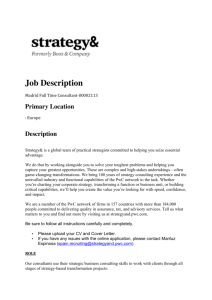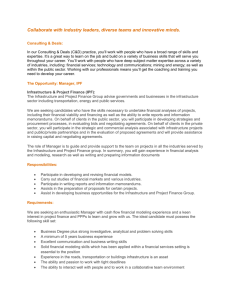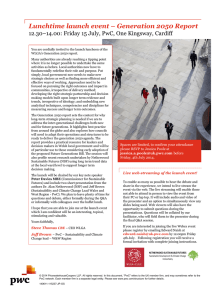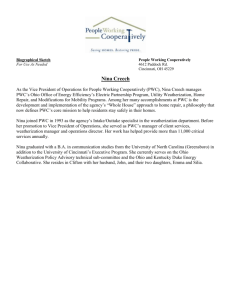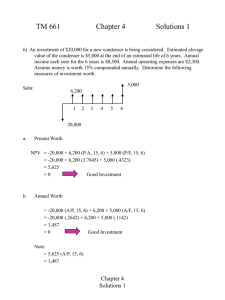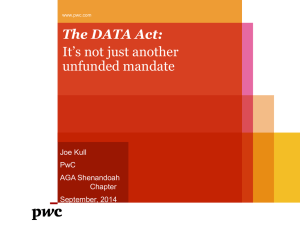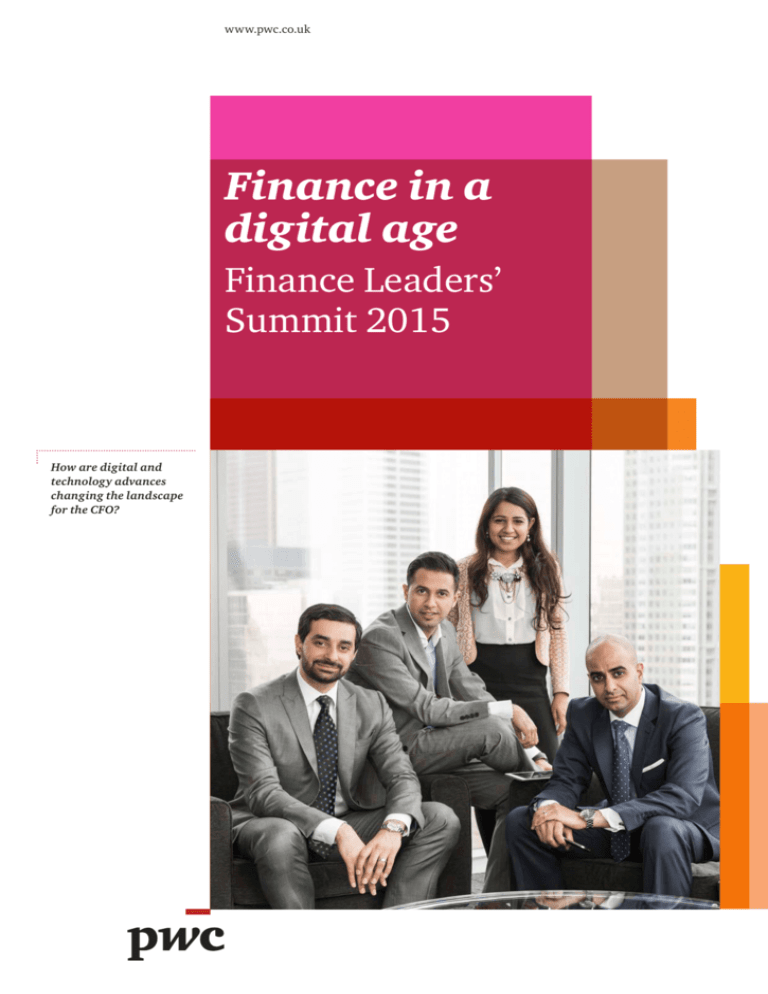
www.pwc.co.uk
Finance in a
digital age
Finance Leaders’
Summit 2015
How are digital and
technology advances
changing the landscape
for the CFO?
Contents
How are digital and technology advances
changing the landscape for the CFO?
2
Swept up or swept aside
2
Foundations for success
4
A new way of doing business
9
Contacts10
How are digital and technology advances
changing the landscape for the CFO?
Digital isn’t just a question for
technology leaders as it is becoming an
increasingly central part of our personal
and professional lives. Digital isn’t just
transforming how businesses create
value, but how value is defined. The
challenges for you as a CFO not only
include how to make sense of the
disruption, but how to drive value from
digital and improve business decision
making by optimising the use of data in
your organisation.
At our 2015 Finance Leaders’ Summit
in London, more than a hundred global
finance leaders shared insights and
debated the impact of digital on the
finance function. Here is a summary
of what was discussed at the summit.
Swept up or swept aside
Is your business equipped for disruption?
“Disruption is happening with or without
us,” said a participant at our 2015 Finance
Leaders’ Summit. The question is no
longer whether to respond, but how and
how quickly. “The biggest risk is doing
nothing,” reflected another participant.
However in reaction…
Digital allows businesses to get closer to
customers, understand their needs better
and develop more responsive solutions.
Advances in analytics mean that
companies can not only anticipate what
will happen (predictive analytics), but also
shape the outcomes the business wants.
Constantly learning and adapting
artificial intelligence not only allows
businesses to operate at increased speed
and lower costs, but also make sense of
data volumes that are beginning to defy
human comprehension.
Yet businesses also have to compete in
marketplaces where innovations soon
become expectations, customers can
compare and switch in an instant and
even market leaders run the risk of being
side-lined by new entrants and new
business models. The need for constant
competitive regeneration is highlighted by
the ever shrinking life expectancy of
major corporations. The shift in market
value from property and plant to ideas and
relationships is characterised by the rise of
businesses such as Uber and Airbnb.
Despite being among the world’s most
highly capitalised transport and hotel
enterprises respectively, these companies
hold little in the way of physical assets.
Digital is everywhere; above
the glass, on the glass and
below the glass. It’s about
redefining the business model
and driving the right
conversations (above the
glass), using a multitude of
devices (on the glass) and
simplifying underlying
systems (below the glass),
empowering people and
enabling deep
organisational change.
Matthew Tod
PwC digital keynote speaker
PwC | Finance in a digital age | 2
Forward-thinking businesses are
responding to disruption by embedding
innovation into everything they do.
They’re creating an organisation that is
as agile as the new challenger. They’re
able to move quickly, learn from
mistakes and innovate to meet the next
challenge. Products become platforms
for services as the ‘Internet of Things’
draws in data and accelerates the move
to maintenance and pay-as-you-use
models. In turn, data is the currency of
value, enabling businesses to shape
outcomes, price dynamically and
procure and mobilise resources in the
most efficient and cost effective way.
What is the CFO’s key role within this
rapidly evolving marketplace? How can
finance remain relevant when only a small
fraction of business value is reflected in
the balance sheet and incremental
budgeting and forecasting are giving way
to the need to continually challenge and
change entire business models?
In many ways finance’s objectivity and
analytical skills are more important
than ever, helping business leaders to
understand what the digital
developments mean for their
organisations and determine the
strategies and capabilities needed to
respond. Yet as analytical tools become
cheaper and easier to use and are
deployed across the organisation with
self-serve capability, finance needs to
stand out on the quality and incisiveness
of its advice. “If finance isn’t able to fulfil
the role of data interpreter and
organisational influencer, someone else
will step in,” said a participant.
For many finance teams, this requires
new ways of working and new
perspective on how they see the world
within which the organisation operates.
“We need to look beyond digital as a cost
play to see it as an engine of insight,”
said David Doyle, PwC’s Digital Finance
Leader. “The past is certain and the
numbers stack up,” said another
participant. ‘But as the focus of our
analytics moves from what’s happened
to what’s coming, we need to accept that
our measurement is going to be less
certain and precise.’
The continuing challenge is how to
maximise the value of the internal and
external data the business holds, much of
which is not exploited to its full potential
today. Traditionally, finance teams have
had data that they can turn into
information because they could reconcile
it through accounting controls. External
data is less structured and requires the
finance professionals of the future to ‘let
go’ and accept that 90% accuracy will
inform a decision much better than not
using unstructured external data at all.
Digital is driving business
insight. Ownership of that
insight is vital and finance has
a key role to play; we need to
develop people who have a
deep insight into the business
and know how to derive value
for the business.
Brian Furness
PwC Finance Consulting
Leader
PwC | Finance in a digital age | 3
Foundations for success
Mastering the digital challenge
The summit explored the practicalities
of realising the digital potential around
the five pillars of data and analytics,
cloud and agility, collaboration, the
digital workforce and cyber security.
What do these new demands mean for
how finance functions operate and what
skills, systems and behaviours do they
need to apply?
Collaboration
Digital workforce
Cloud and
agility
Data and
analytics
Cyber
security
The five pillars of digital
Data and analytics
Data and analytics is not a new concept,
however, data sets, tools and processing
speeds are now more advanced –
providing finance with the opportunity
to drive more insight faster. The data
landscape has now changed allowing
finance to ask questions with
unstructured data sets. Finance now
needs to determine what the right
questions are to drive business strategy
and promote the ‘art of the possible’.
Rather than replacing humans with
machines, decision making will
continue to be a combination of human
intuition and analytics – ‘guts and
gigabytes’. But in many markets there is
still considerable potential for greater
use of analytics, for example, the UK. In
a global PwC survey, we found that only
23% of UK executives placed most reliance
on data and analytics when making their
last big decision, compared to 41% who
trusted to their intuition and experience.1
Scattered analytical operations are
likely to give way to more specialised
centres of excellence, with the key focus
on what winning strategies and
performance look like and how to shape
the desired outcomes. The traditional
view of the finance professional is
someone who is prudent and focused on
accuracy. Although this is still
important, we’ll need to display more
creativity, innovative thinking and the
ability to work with a mix of
stakeholders internally and externally.
‘Guts and gigabytes: Capitalising on the art and science in decision making’, a joint study by PwC and the Economist Intelligence Unit, 2014
1
PwC | Finance in a digital age | 4
Should finance be the custodian of the
data and lead analyst of enterprise-wide
rather than just financial data? In a poll of
participants, the vast majority agreed that
finance is the ‘core home’ for data and
analytics within their organisation. For
others, however, the key question is not
who owns the data, but how to collate,
validate and link it to the big picture.
With all the data we have available, finance needs to be asking the right
questions and to do this we need diverse teams with different skills sets
to spark creativity and debate, not just an army of accountants.
Brian Furness
PwC Finance Consulting Leader
Cloud and agility
Traditionally cloud and software-as-aservice (SaaS) solutions were perceived
to be reserved only for young, start-up
enterprises, but summit discussions
showed this is no longer the case. In a
poll of participants, 75% said that they
had either switched finance to the cloud
already, or plan to do so within the next
three years.
The advantages include a more flexible
and cost-efficient way to keep pace with
digital developments and an ability to
match computational capacity with
demand; “the ability to move from capex
to opex has to be a key part of the
business case,” Jemma Ingham, PwC’s
Finance Cloud Leader.
Finance needs to release control and
start collaborating with others to take
advantage of cloud based solutions.
While security will always be a concern,
several participants noted that SaaS
providers’ commercial reputation
depends on effective protection and they
are therefore better equipped to make
the necessary investments. Compliance
with data regulations is also an issue,
especially with regards to concerns on
where personal data from a particular
country resides, which may conflict with
centralised cloud databases. Further
challenges include navigating the data
regulations which differ by country.
Finance should alert IT and legal teams
about these issues from the outset.
As pioneers’ experience shows, the
transition can be challenging. The
technologies are flexible and can be
adapted to the business, rather than the
business to fit the technology. You set
the pace of change from radical to a
more measured pace. It’s about how
willing your people are to accept the
change, which puts more emphasis on
the organisation’s approach to change
through engaging communications and
effective training.
‘Your next big [IT] change has to be
SaaS. It’s insane to host anything
anymore’ said a client speaker during
the finance in the cloud panel debate.
More and more I hear my clients saying you’d be mad not
to consider the cloud for your finance systems and many
organisations are now well advanced on that journey.
Jemma Ingham
PwC Finance Cloud Leader
PwC | Finance in a digital age | 5
Collaboration
Digital has changed the way we work,
opening up ways to collaborate more
closely within virtual teams. For finance
in particular, it opens up opportunities
for many teams to work together, real
time on both reporting and analysis in
parallel, rather than passing work from
one person or team to another sequentially.
We’ve seen digital focus on improving
relationships for the customers of
finance outside the business, which is
impacting the external relationships
with customers. As a result, we’re likely
to see what a participant described as
the “consumerisation of finance
technology”.
Outside work we’re used to using social
media and other collaboration tools to
share ideas and make quick decisions.
For digital natives who are used to using
social tools within their personal lives,
this more collaborative approach is an
expectation at work, demonstrated from
feedback at the conference to show most
delegates, newest intakes of graduate
staff would sacrifice a degree of pay for
a modern workplace technology. This
highlights that if you don’t embrace this
change, you risk losing out on top talent.2
There is some way to go, however. “At a
time when social collaboration tools are
cheaper, more secure and readily
available than ever, it’s surprising how
many finance teams are still emailing
spreadsheets,” said a participant. The
answer isn’t just about technology, but
embracing collaboration as a skill and
building it into the wider systems
infrastructure.
Finance has operated for
generations in the same
repetitive cycle – pulling raw
data into a spreadsheet,
emailing it to several
colleagues, waiting for, and
chasing responses, then
finally attempting to
consolidate the conflicting
responses. This just doesn’t
allow for effective interaction
or the questioning of the data,
which the business needs.
David Doyle
PwC Digital Finance Leader
Collaboration is about bringing in different
viewpoints as collaboration tools aren’t just
about speed, but also the quality of the decision
making process and all the conversations we
have. This means people and processes are as
important as technology and tools.
Brian Furness
PwC Finance Consulting Leader
The future of work: A journey to 2022, PwC 2014
2
PwC | Finance in a digital age | 6
The digital workforce
During the summit, participants talked
about the different roles of finance and
the pressure to adapt their skills sets
around data analysis, insight and
collaboration. More and more
organisations are bringing in data
scientists to sharpen their analytical
capabilities. But finance professionals
still have a big part to play in setting the
right questions and turning the analysis
into commercial insights.
The new digital workforce has
fundamentally changed the role of
shared services, with many rules based,
number generator roles set to be taken
over by artificial intelligence. The key
goal is informed decision making, leaving
business partners free to concentrate on
engaging with the business and
delivering insight and advice.
The business partners that emerge will
be more collaborative and strategicallyfocused, with less processing
responsibilities. People from within the
business will work with a wide range of
stakeholders and vice-versa, creating
greater opportunities to move into senior
leadership and business partners working
closer with the business.
We’ve had systems and technology and now we have
artificial intelligence that challenges rules based
accountancy, artificial intelligence could be
transformational but many of the organisations
I speak to don’t quite know how.
Anish Shah
PwC Digital Workforce Leader
PwC | Finance in a digital age | 7
Cyber security
The number of cyber incidents is
growing exponentially, increasing the
risk and highlighting that it isn’t just IT
that should react. It’s not uncommon for
organisations to be bombarded with
phishing emails, Trojans and multiple
virus attacks. What is the finance
functions role in this?
The challenges of getting on top of cyber
security are highlighted in PwC’s latest
Global State of Information Security®
Survey, which reveals that there are
117,000 attacks a day on average, a 48%
year on year increase in detected global
information security incidents in 2015.3
While the popular image of the
perpetrators often centres on hacktivists
or criminal gangs, they could just as
easily be disgruntled employees. Our
experience shows many companies don’t
even know when they’ve been targeted.
3
As one of the main custodians of
sensitive information within the
business, finance teams have a crucial
role to play. It’s their job to know where
information is at all times, how it’s
secured, who might want to steal it, and
how they might gain access to it. The
CFO should take the lead in assessing
and advising the board on the full
financial impact of a cyber-attack. It’s
impossible to protect everything, so
finance should help to identify the most
value assets that differentiate your
business and are in most need of
protection. Breaches will still happen, so
it’s vital to have clear and credible
contingency and communication plans
ready to go.
Global State of Information Security® Survey 2016, a worldwide survey by CIO magazine, CSO and PwC. 627 of the 10,040 executives from 127 countries who
took part were from the UK (www.pwc.com/gsiss).
PwC | Finance in a digital age | 8
A new way of doing business
Digital is a great opportunity to improve
how businesses interact with customers
to create value, as well as allowing
finance to interact in a more relevant and
impactful way with stakeholders both
within and outside the organisation.
Therefore digital isn’t just important in
the way the businesses engage with their
commercial customers, but also the
customers finance serves and how the
function is run.
Digital is a strategic rather than
technological issue, enabling businesses
to find new ways to solve problems,
create unique experiences, deliver
efficiencies and accelerate business
growth. Underpinning this is the need to
engage with customers, employees and
investors and secure their trust in an era
of uncertainty and change.
Finance is uniquely equipped to foster the
trust, insight, empowerment and agility
needed to realise that potential. Yet to
achieve this, it can’t insulate itself from
the disruption and cultural challenges
facing all areas of the business world.
Forward-looking CFOs are already
bringing in the new skills, systems and
collaborative ways of working needed to
succeed. Those that do nothing, not only
risk losing relevance within the business,
but also talent and investment within
their function.
PwC | Finance in a digital age | 9
Contacts
If you would like to take part in the next Finance Leaders’ Summit or would like to
know more about how PwC can help to take your business forward, please contact
one of the following Summit hosts:
Tom Brown
Partner, UK
E: tom.r.brown@uk.pwc.com
Brian Furness
Partner, UK
E: brian.j.furness@uk.pwc.com
Martin Petry
Partner, Germany
E: martin.petry@de.pwc.com
To follow our thought leadership and insight, please go to www.pwc.co.uk/finance/
finance-matters.
This publication has been prepared for general guidance on matters of interest only, and does not constitute professional advice. You should not act upon the
information contained in this publication without obtaining specific professional advice. No representation or warranty (express or implied) is given as to the accuracy or
completeness of the information contained in this publication, and, to the extent permitted by law, PricewaterhouseCoopers LLP, its members, employees and agents
do not accept or assume any liability, responsibility or duty of care for any consequences of you or anyone else acting, or refraining to act, in reliance on the information
contained in this publication or for any decision based on it.
© 2015 PricewaterhouseCoopers LLP. All rights reserved. In this document, “PwC” refers to the UK member firm, and may sometimes refer to the PwC network. Each
member firm is a separate legal entity. Please see www.pwc.com/structure for further details.
151204-130609-EM-OS

